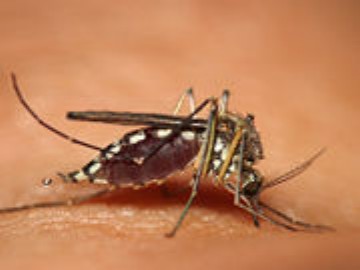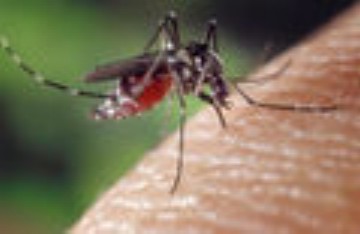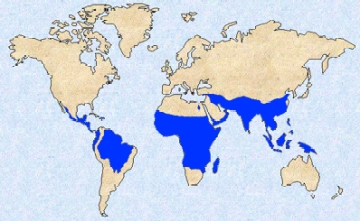
Mosquito on Human Hand
The Mosquito Barcoding Initiative (MBI) has teamed up with the ‘Scholar Ship’ to barcode mosquito species from across the globe. The ‘Scholar Ship’ is a first of its kind ocean-going academic program. Created especially for an international student community, it represents 35 nations and is carrying over 200 university students. Starting in Athens, the ship will cross continents and dock at various ports including those in Africa, Asia, and South America.
The ‘Scholar Ship’ will also function as a floating research institute. Indeed prior to its odyssey, the ship was equipped with a high-tech DNA bar-coding lab. This lab will allow it to pick up, identify and barcode mosquito species from several different countries.

Malaria Mosquito
The global mosquito DNA bar-coding initiative was launched 2 years ago at a conference in London. Hosted by the Natural History Museum, top international mosquito experts were invited to participate in this initiative. The aim was bring together the best minds to develop an innovative system that would identify the DNA of the 3500 mosquito species known to mankind. The hope at that time that developing such a system would allow for the creation of a database that would be easily accessible to researchers and practitioners world-wide, allowing them to easily and quickly identify local mosquito species, and learn the best way of destroying them.
This week, it will be announced at a conference that using a barcode system similar to that commonly found at supermarket checkouts is turning out to be one of the most accurate methods of identifying the different mosquito species. The way DNA bar-coding works is that first a tiny electronic device is used to read the mosquito’s DNA. Then this reading is reviewed against an existing DNA database. On identification, the researchers will have immediate access to all information related to the mosquitoes’ lifecycle including breeding and resting sites. These can then be targeted efficiently for destruction.
Yvonne-Marie Linton the biomedical researcher at the Natural History Museum who leads the Mosquito Barcoding Initiative (MBI) said:
Managing malaria doesn’t mean getting rid of all mosquitoes, it means controlling the key species that transmit the disease. But different mosquito species can look so similar that it’s hard to identify them, which undermines any attempts at control. DNA barcoding offers a cheap and accurate way of telling the difference between species, based on snippets of DNA code.
The MBI has already made more than 3000 DNA records for more than 390 species available since we started six months ago, but there is still lots of work to be done. The good news is we are already starting to see significant progress in some malarial-stricken areas.

Global Distribution – Malaria
The MBI plans create DNA sequences of 80 per cent of all known mosquitoes over the next 2 years. The database will also include detailed information on the species that transmit mosquito-borne diseases. This initiative is made up of a total of 13 international institutions and is led by the Natural History Museum and the Smithsonian in Washington DC.
Linton added:
This is a very exciting project and we are getting an amazing amount of co-operation from across the world which is allowing us to move on at speed. The first rule of warfare is that you have got to know your enemy because it is only then that you can learn how to defeat it. At the moment we are not doing too good a job in beating the mosquito so I think this project is absolutely critical.
Interestingly, this is the first time mosquito researchers from around the world have collaborated in a global effort to tackle mosquito-borne diseases. Over 500 million people globally are infected with malaria and as many as 1 million succumb to this disease annually. Other potentially fatal diseases that mosquitoes carry include dengue fever, West Nile fever, yellow fever, encephalitis and filariasis.
It is believed to have been aggravated by global warming which has seen mosquitoes reach new areas of the world including North America.
Read: The Telegraph
Image: 1; 2 3


